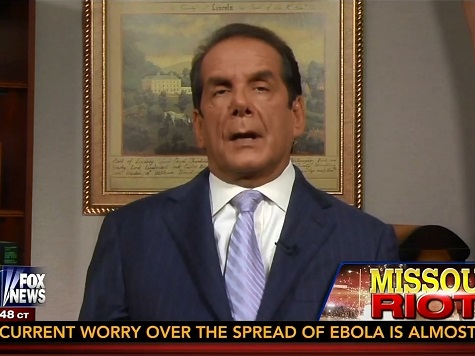On Thursday’s broadcast of “Hannity” on the Fox News Channel, Washington Post columnist Charles Krauthammer sounded off on the turmoil surrounding the killing of Michael Brown by local St. Louis law enforcement and the protests that followed.
Krauthammer explained why it had become a national story and had given President Barack Obama cause to comment on it. But he also traced the origins of such turmoil in incidents like Ferguson, MO and earlier years’ Trayvon Martin-George Zimmerman case and said given the indiscretions of the United States’ past, these incidents will keep occurring until there is a sense of “equal justice.”
Transcript as follows:
HANNITY: Let me first, before we get to the Iraq situation, let me play for you this police chief from earlier this afternoon. A lot of focus on what’s happened in Ferguson, Missouri. And for the president to get hit this hard, it said I would content that discussing police tactics from Martha’s Vineyard is not helpful to ultimately calming this situation. I think what he has to do as president and as a constitutional lawyer is remember that there is a process in the United States, and the process is being followed, for good or for ill, by the police and by the county and by the city and by the prosecutor’s office. I mean, for a president of the United States to get lectured that way about not involving himself, what was your reaction to that?
KRAUTHAMMER: Look, I think what’s happening now is there are a lot of people here who not only are enflamed, both the rioters and the people who have to prevent the riots, and feel that they are being maltreated, both sides, but also a sense of some people being over their heads. You know, the local police chiefs generally don’t have to deal with national rioting. It’s become a national story. And I think they resent being told what to do from afar.
But, you know, is the president working on what he’s seeing on television, or is he getting some informed opinion from his aides? I assume he is, from the FBI and others. We don’t know the whole story. I think it’s always better for the president to speak more generally when the facts aren’t known.
But I thought he covered a lot of bases in which he basically said to all sides to calm down. I don’t think that’s a moral equivalence. He was, you know, very straight about the rioters and the looting and all that. But you’ve got to be real careful. Remember with Professor Gates, he jumped in right away with not much evidence, and then he had to have the beer summit as a way to undo the mistakes he made.
HANNITY: Is it a fair criticism that there’s been three high profile cases where he’s jumped in, the Gates case, Trayvon Martin, and now this case, and then look at all the kids that have died in Chicago, his old home state, and he really hasn’t said much about that. Is that a fair criticism?
KRAUTHAMMER: Well, I think they’re separate issues. I think it’s a criticism that he perhaps hasn’t said or done enough about the violence inner city, which is not interracial. It’s intra-racial. But when it comes to a situation like this, look, the fact is we have a doleful legacy of hundreds of years of discrimination, and before that, slavery. So it isn’t as if this comes without context. And we had many, many generations where African-Americans were on the wrong side of being treated equally under the law. So there’s always that sense.
Now, I don’t — I think it’s a huge exaggeration and an exploitation of that history for an Al Sharpton to show up every time there’s a racial incident involving whites and blacks. But nonetheless given the history, it’s a neuralgic point, and it is unfortunately always going to be so until there’s a sense universally in the country that there’s equal justice.
Follow Jeff Poor on Twitter @jeff_poor

COMMENTS
Please let us know if you're having issues with commenting.